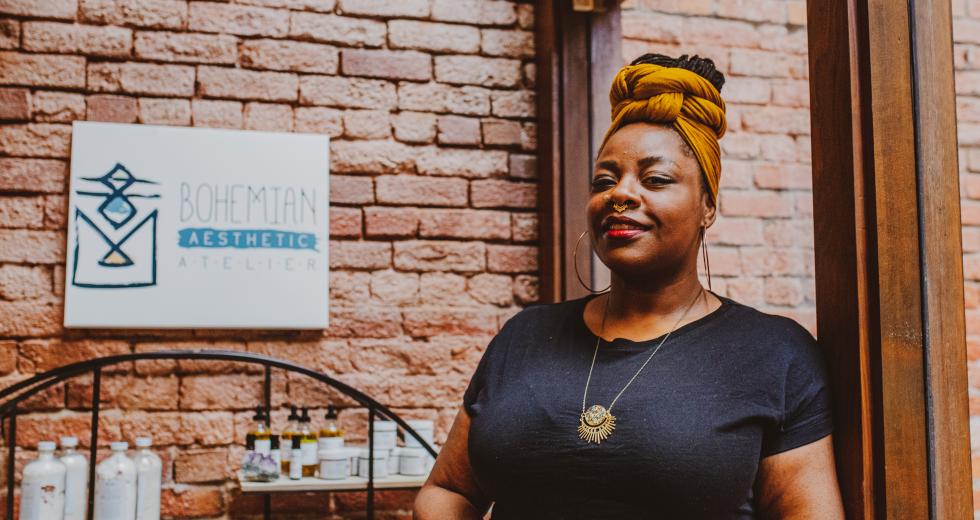Lei Green operates her beauty studio, Bohemian Aesthetic, with love. As a former accountant, it’s safe to say she also operates from a grounded, numbers-based mindset. But when it comes to hand-making wellness products and working with her clients, she “gravitates from the central point of love.” Her clients must feel it, because her business was able not only to survive 2020, but to pivot to an adjacent business model.
For 15 years as an accountant, Green helped business owners focus on their objectives so they could realize their dreams. While she says she enjoyed being in the position of helping others, she ultimately longed to indulge her own poetic nature and creative passions. “I’m a creative, and I love to use my hands. If you get creative in accounting, you go to jail, and that’s not my life,” she jokes. As she began to explore the art of permanent makeup, she felt increasingly fulfilled by the personal connections she made and made moves to make it her full-time career.
Green opened Bohemian Aesthetic in downtown Sacramento in 2018 as a beauty studio offering permanent makeup, nails and other cosmetic services. When the pandemic limited the studio’s ability to offer in-person treatments, she began to recreate the studio’s self-care experience by offering wellness products her clients could enjoy at home. Green now carries the products of 30 makers, many of them women of color. She is considering ways to tailor self-care to the five “love languages,” helping clients care for themselves in a more resonant way.
From permanent makeup to a flexible business model: Starting the business, I called us a beauty collective. I created the space (to support others like me) because I was moving from the traditional … “You could be a doctor, a lawyer, an accountant.” So I moved from accounting into this space of being more creative, but I also saw how expensive it was to do that.
Having the position that I had, I wanted to create a space, not only for myself to work, but also for other artists who were entering the industry of permanent makeup and aesthetics to have a space that they could utilize and essentially jump-start their careers — build their own clientele while here, and then branch out and create their own enterprise. So that was the initial idea of the business. But since we haven’t been able to do services and be hands-on with people, it has morphed a bit.
Now I exist in the space of curating a collection of products that are all made by women, a lot of them women of color, that resonate with the type of person that has walked through the doors prior to us having to close them due to COVID.
Lei Green has pivoted her beauty studio to offer more wellness
and self-care products for customers to use at home.
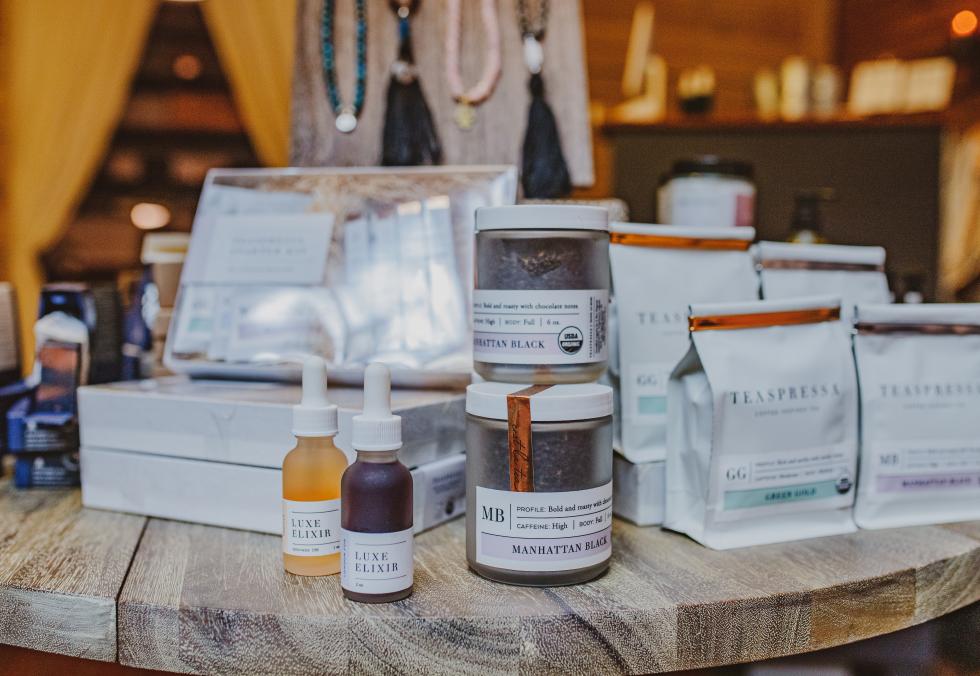
On a new way of looking at the pivot: (The post-pandemic pivot) really felt like, not necessarily a rebirth of Bohemian Aesthetic, but like Bohemian Aesthetic’s twin that came just a few minutes later. That’s what it feels like to me. (The business) is created from a need, whether it’s our own needs or whether it’s the needs that we see in our communities. The services came first, but partnering with these amazing brands came just a little bit later. It’s its twin, and I love both of my babies equally.
On a natural take on interior decor and on the artistry of permanent makeup: I was very intentional. The way I created my space is to be very warm and natural and inviting. And the space itself lends itself to also the type of (permanent makeup) work that I do, because there’s a place and a space for everyone.
I fell in less on the side of glam and more into the side of normalcy and simplicity. Just enhancing what (features) people do have as opposed to creating something completely new. And that was very important to me. Every artist kind of has their own approach, and because it is art, it is very subjective. But the people that are drawn to me have appreciated the way that we go about things here — the lighter, more natural (look).
How we reach our audience and spread the word: We’ve been in business since 2018, so word of mouth has become kind of our main source of securing new clients, because our clients love us. I think it’s because of the person that we speak to. I’m very intentional about that because there’s so many people who do what we do. But our approach is: We provide a service, but we serve the whole person. We take that into account when we meet with people, sit with people and provide services to people.
Also: social media, social media, social media. That’s a big way: interacting and engaging with people (on social channels).
On whether conversations around supporting Black businesses have had an impact: This year has been interesting. I mean, it’s more than sales, it’s the conversation. That’s what I’ve noticed. It’s more about people being more intentional about it. Does it translate into dollars? Not all the time, but people are definitely being more mindful of where their money goes, who their money goes to. So I have seen that more based on conversation than revenue. The revenue is important, but it’s really about the hearts and minds of the people, and I have seen a shift in that.
On moving from the Bay Area to Sacramento: I grew up in the Bay Area, and I moved here in 2013. My life was very different (when I first moved here). I was very much an accountant, very much an insular person. Just my nuclear family, my husband, my children, kind of moving in that way.
And coming from the Bay Area to here, now that I’ve started to face outward, I see how dynamic Sacramento is. I see how vast it is. I see how diverse it is. Whereas before, I didn’t really have that appreciation for it, because it was what I needed to do. Come home, tend to the children, tend to the house, tend to the life. But now that I see community and I’ve seen what Sacramento is, it is amazing. It’s so diverse. There’s so many people. I have really made it a goal just to really just explore and absorb all that it is.
What I’m currently binge listening and reading: I’m a music junkie. I love, love, love music. I’m a playlist curator. So when it’s time to turn up, there’s one for that. When it’s time for bed, there’s one for that. It really depends on my mood, but (for times when) I’m in the space of creating, I created a playlist that’s called “The Ritual.” On there, there’s India Arie, there’s Jhené Aiko. There’s a lot of feel-good music, songs that are affirming and inspiring.
I’ve been reading a lot. There’s a book that I’ve read four times since I’ve been introduced to it. I think that I set a goal of reading 35 books this year, and I’m at 32 because I read this book four times. It’s called, “One Truth, One Law: I Am, I Create.” It’s very spiritual, and it’s about connecting with the “source energy,” whatever you call it, and creating from that place. That book has been so transformative.
The project I’m most excited about right now: Right now, I’m pulling together The Ritual. I started to make my own products — candles and soaps and bath bombs and lotions and things like that. The Ritual is a box of self-care products. I’m working on creating a story around creating a ritual of self-care, whether that includes the full moon, the new moon, the winter solstice, summer solstice — creating stories and a ritual around that and the way we care for ourselves.
On speaking your love language to yourself: I’ll often look at the five love languages and how we apply that to other people in the way that we love and show up to other people. But we don’t necessarily look at ourselves when we talk about those love languages, the ways that we can serve ourselves with those things, learning your love language, and loving yourself that way. Self-care and self-love go hand in hand to me. So The Ritual Kit is geared around that premise — just spending time with self, falling in love with self and caring for self.
–
Stay up to date on business in the Capital Region: Sign up for the Comstock’s newsletter today.
Recommended For You
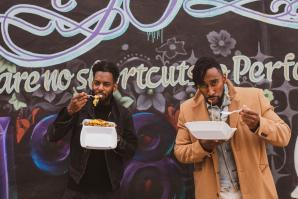
Getting to Know: Ryan Royster and Byron Hughes
Last Supper Society cofounders on building an experiential dining venture virtually
The cofounders of Last Supper Society describe their project as “a culinary collective that designs food experiences,” as well as “a first-of-its-kind interactive TV show.”
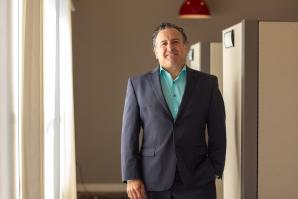
Getting to Know: William Glasser
Founder and CEO of Language World Services in Carmichael on how his translation business bridges a critical gap
It’s crucial for people who have limited English proficiency to process information accurately as they navigate complex systems, and William Glasser has focused his career on helping them do so.
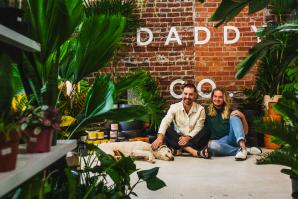
Getting to Know: Jacob Dill
Co-owner of Plant Daddy Co. in East Sacramento says retail business is booming
Luke Swanson and Jacob Dill, cofounders of Plant Daddy Co., are partners in life and business and discovered the joy of plant parenthood in their 20s living in San Francisco and Portland.
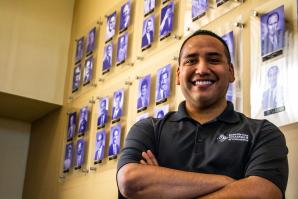
Getting to Know: Kevin Hernandez
Roseville chamber director of events and sponsorship aims to create connections for professionals
Kevin Hernandez is a people person. His enthusiasm, extroversion and passion for creating connections among people is palpable through the television screen where, for seven years, he has appeared on “Good Day Sacramento.”



